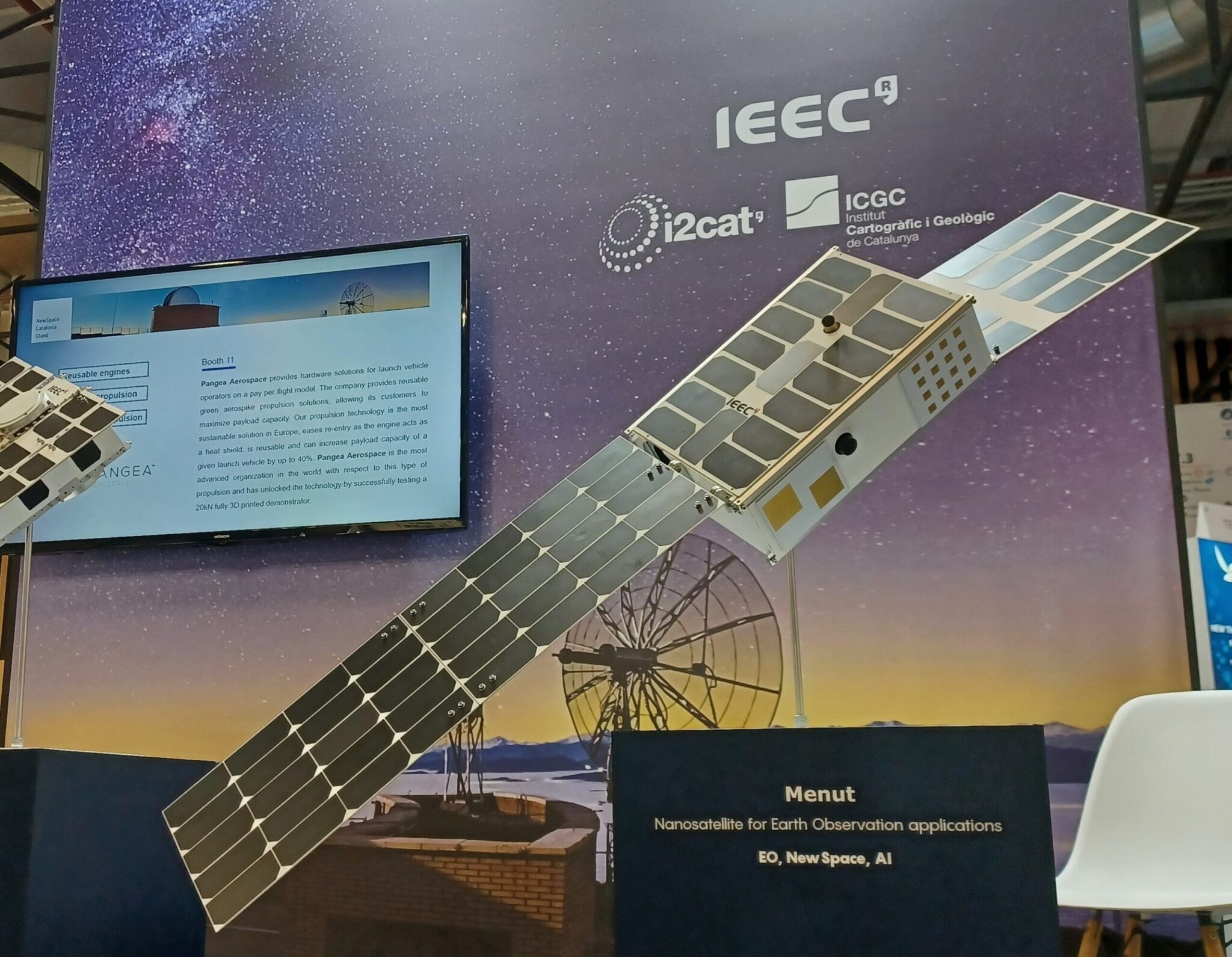The nanosatellite ‘Menut’ will be part of the ‘shared’ OpenConstellation to face the challenges of the climate emergency

Created and managed by Open Cosmos, the OpenConstellation is a unique 'shared' satellite infrastructure to which the main European space organisations have already joined
The constellation will allow access to satellite data to face global challenges related to the climate emergency, the energy crisis and natural resources and disasters
The OpenConstellation announcement was made in the framework of the 'IAC 2022' space congress in Paris, where Catalonia is participating for the first time with its own stand promoted by the Department of the Vice Presidency and Digital Policies and Territory of the Generalitat and the IEEC
The second nanosatellite that the Catalan Government will put into orbit at the end of this year as part of the NewSpace Strategy of Catalonia, 'Menut' (which means small), will be part of the OpenConstellation, a set of nanosatellites that will work in a coordinated manner. This infrastructure will make it possible to face global challenges related to the climate emergency, the energy crisis and natural resources and disasters, among others.
The announcement of the OpenConstellation, created and managed by Open Cosmos, the company awarded the construction, launch and operation of the 'Menut', was made today in Paris as part of the 73rd edition of the International Astronautical Congress (IAC 2022). The IAC, the most important space event in the world which is being held these days at the Paris Convention Centre (September 18 – 22), is hosting Catalonia with its own booth for the first time.
The OpenConstellation project was born with the aim of becoming the largest global and shared infrastructure of Earth observation satellites in the world. In this regard, some of the main European space organisations have already contributed the first set of satellites to the constellation.
The 'Menut' nanosatellite —developed by the Generalitat de Catalunya and the Institut d'Estudis Espacials de Catalunya (IEEC)—, and the 'Mantis' —from the UK Space Agency and the European Space Agency (ESA)— will be the first two of the 7 satellites that will make up the first generation of the OpenConstellation. Both nanosatellites will be put into orbit at the end of this year.
The constellation will subsequently incorporate new batches of satellites, based on contributions from current and new members, with the aim of reaching a total of 25 satellites with the combination of spatial and spectral resolution required by the market.
Due to its shared infrastructure nature, associate members will provide their satellites in exchange for access to constellation data. The constellation is based on advanced digital technologies that Open Cosmos has developed in collaboration with space agencies and combines the latest satellite telecommunications capabilities (onboard processing and compression, embedded Artificial Intelligence, satellite Internet of Things (IoT) connectivity and laser communications…) with Earth observation sensors and the most advanced data processing capabilities.
The processed data from the OpenConstellation satellites will be available for partner agencies and entities to access and analyse through the Open-Cosmos data exchange platform, DataCosmos. Thanks to this data, challenges such as monitoring agricultural programmes, detecting environmental threats and identifying illegal mining practices may be addressed.
International cooperation, as well as the projection and connection of the Catalan ecosystem with other poles of international-nature innovation, are some of the objectives of the NewSpace Strategy of Catalonia—promoted by the Department of the Vice-Presidency and Digital Policies and Territory, the Institute of Space Studies of Catalonia (IEEC), the i2CAT Foundation and the Cartographic and Geological Institute of Catalonia (ICGC)—. In this sense, the OpenConstellation is a collaborative environment to promote the exchange of knowledge and technological partnership, strengthening relations between government agencies and establishing industrial policy agreements in the space sector.
Main Image
‘Menut’, the second nanosatellite of the NewSpace Strategy of Catalonia. Credits: IEEC
Links
– IEEC
– Institut Cartogràfic i Geològic de Catalunya
– Fundación i2CAT
– Sateliot
– NewSpace Estrategy of Catalonia
More information
The Institute of Space Studies of Catalonia (IEEC — Institut d’Estudis Espacials de Catalunya) promotes and coordinates space research and technology development in Catalonia for the benefit of society. IEEC fosters collaborations both locally and worldwide and is an efficient agent of knowledge, innovation and technology transfer. As a result of 25 years of high-quality research, done in collaboration with major international organisations, IEEC ranks among the best international research centers, focusing on areas such as: astrophysics, cosmology, planetary science, and Earth Observation. IEEC’s engineering division develops instrumentation for ground- and space-based projects, and has extensive experience in working with private or public organisations from the aerospace and other innovation sectors.
IEEC is a private non-profit foundation, governed by a Board of Trustees composed of Generalitat de Catalunya and four other institutions that each have a research unit, which together constitute the core of IEEC R&D activity: the Universitat de Barcelona (UB) with the research unit ICCUB — Institute of Cosmos Sciences; the Universitat Autònoma de Barcelona (UAB) with the research unit CERES — Center of Space Studies and Research; the Universitat Politècnica de Catalunya · BarcelonaTech (UPC) with the research unit CTE — Research Group in Space Sciences and Technologies; the Spanish Research Council (CSIC) with the research unit ICE — Institute of Space Sciences. The IEEC is a CERCA (Centres de Recerca de Catalunya) center.
Contacts
IEEC Communication Office
Barcelona, Spain
E-mail: comunicacio@ieec.cat
